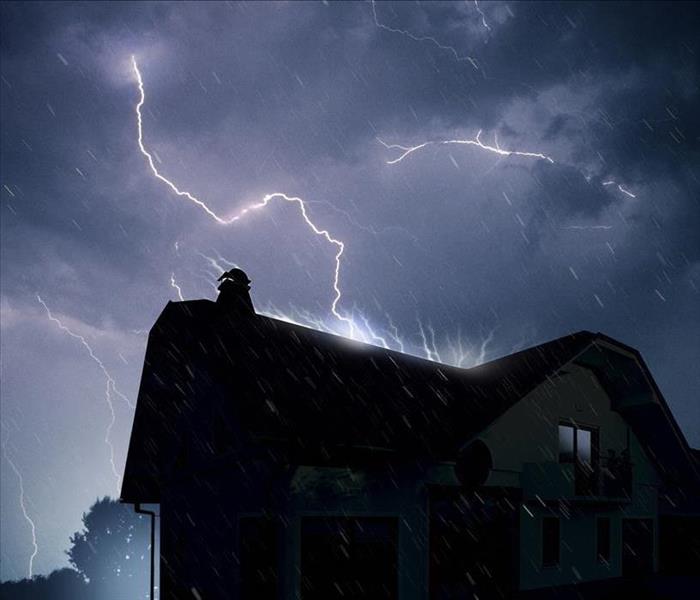Is My Home Susceptible to a Lightning Fire?
10/13/2021 (Permalink)
Although not a high likelihood, virtually all homes are susceptible to being struck by lightning. When it hits, it will take the path of least resistance and could take several different routes through your Kaysville, UT, house. Many parts of a home are conductive, meaning a strike can send a bolt of electricity through electrical lines, phone lines, water pipes, gas pipes, metal framing, gutters, and downspouts, potentially causing a lightning fire. Surprisingly, it can also branch out into more than one path. It has even been known to jump from one course to another through the air (e.g., from a sink to an electrical outlet). This phenomenon is called a side flash. Fortunately, you can take measures to stay safe during a storm and avoid a house fire.
How Can I Keep My Family Safe From Lightning at Home?
You can get a protection system for your home to guard you against a potential strike. However, these systems must be professionally installed, and they are typically very expensive. Usually, it's more cost-effective to be mindful of harmful practices, be aware of safety steps, and ensure that your homeowners insurance covers electrical storms.
1. Avoid Direct Contact With the Ground or Concrete
Many people don't realize that walking in a basement or garage without shoes can be a hazard. An electric current can travel through the soil and be attracted to even slightly damp concrete. Also, avoid walking without shoes on a patio or the ground outside.
2. Avoid Corded Telephones
One of the riskiest activities during a storm is using a corded telephone. Lightning can come through the phone line, striking whoever is talking on it. If you must make or take a call, be sure to use a cordless phone or a cellphone.
3. Avoid Having Direct Contact With Any Wired Electronics
A home's electrical system is a prime target during a storm and can even lead to a lightning fire. Fire damage remediation experts will advise you that you should avoid direct contact with all wired electronics and appliances during a storm. Some of these devices include a computer that's connected to a power outlet directly or via a modem or router that is plugged in, refrigerator, hairdryer, or plugged-in power tool (e.g., an electric drill). You can safely use wireless devices that are not plugged into an electrical outlet, such as cordless phones, cell phones, laptops, tablets, and remote controls.
4. Stay Away from Metal Framed Windows and Doors
Windows and doors with metal frames can conduct electricity, so you should avoid being close to them. Many people find it tempting to stand by the window to watch the storm, but it could also be dangerous.
5. Avoid Using Plumbing
Plumbing is an excellent electrical pathway, so direct contact with it should be avoided during a storm. Taking a shower or bath, doing dishes and even washing your hands could potentially be dangerous.
Your home should be relatively safe from a lightning fire. However, it's better to practice safety all the time. These steps are excellent ways to get started.






 24/7 Emergency Service
24/7 Emergency Service
